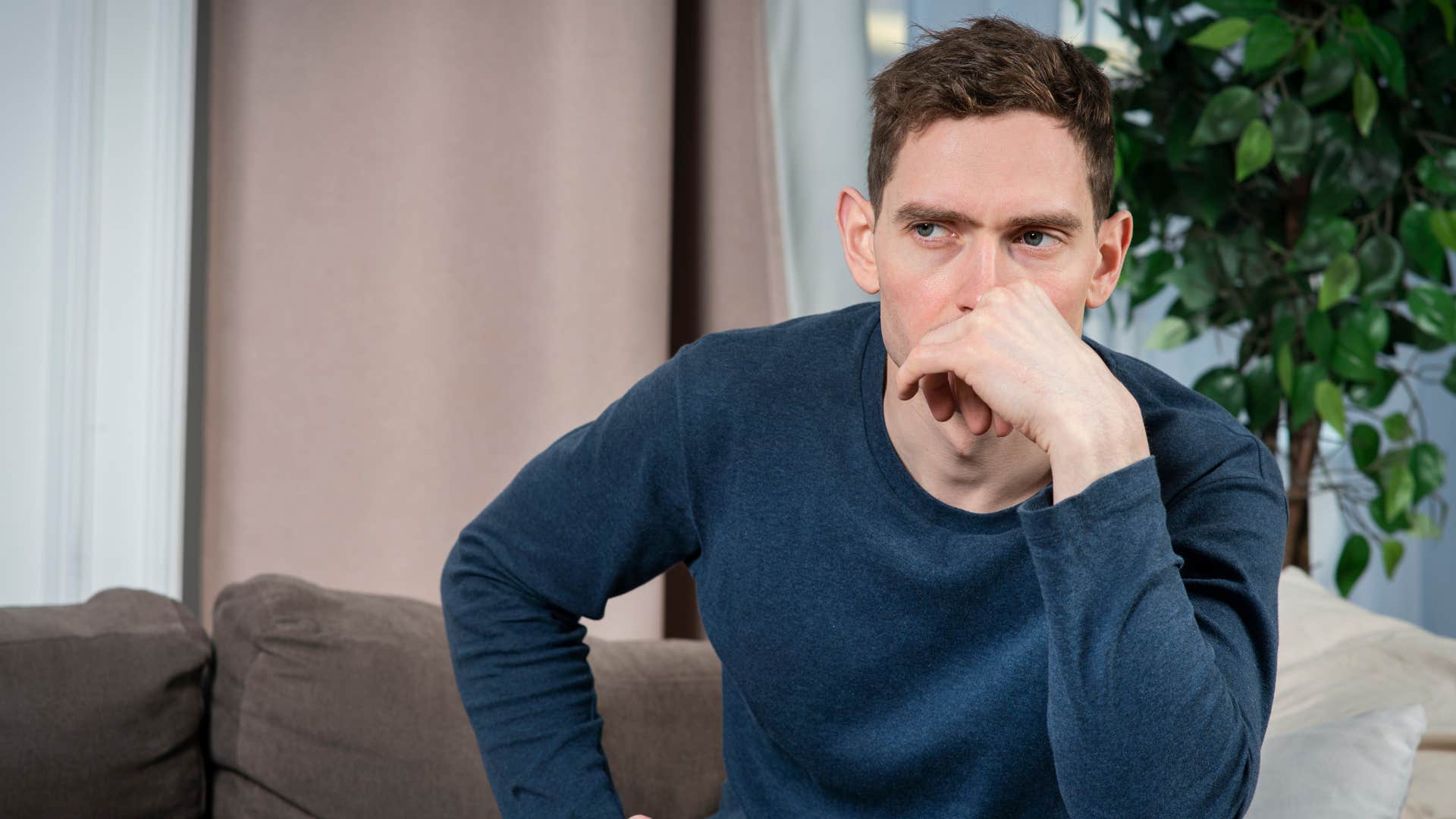10 Things People Do When They're Trying To Look Strong But Are Barely Holding On
Behind that smile lies a lot of pain.
 AVOCADO FAM | Shutterstock
AVOCADO FAM | Shutterstock When people are going through difficult times, they are often pressured to appear strong in front of others to mask their true feelings. Society celebrates those who bury their feelings into other avenues, such as work, and shames them if they dare to speak up. So, instead of reaching for help, many put on a brave face and pretend everything is fine when it is not.
Behind this facade lies the truth that they are doing their best to get through the day while hiding the weight that they are carrying. By recognizing these patterns in them, you can help them and others respond with acts of kindness rather than with assumptions. After all, everyone has moments when they need support, even if they don't know how to ask for it.
Here are 10 things people do when they're trying to look strong but are barely holding on:
1. They say they're 'fine' when, in reality, they're not
 EugeneEdge | Shutterstock
EugeneEdge | Shutterstock
Sometimes, the most powerful support you can offer is reassurance that they don't always have to be fine. It's okay to not be okay. For many, telling everyone that they are 'fine' is easier than trying to explain the pain that they are going through because they can't properly articulate it. They either feel like a burden for bringing it up or fear their feelings won't be taken seriously. A little self-confidence can go a long way here, and for people who try to look strong but are barely holding it together, it could be life or death.
This tendency to conceal true emotions is extremely high in young adults. Research from Time to Change indicates that 88% of young people aged 16 to 24 would tell friends and family that they are 'fine' even if struggling with a mental health problem. With 59%, the top reason was that they didn't want to be a burden to others. This is why it's important to create supportive environments where people who struggle with this can feel safe to express themselves without judgment.
2. They take care of everyone, yet no one cares for them
 VH-studio | Shutterstock
VH-studio | Shutterstock
Doing things for others is noble, but at what cost when you feel abandoned in your time of need? Behind this caretaker role, people may feel deeply lonely or overwhelmed; when they are struggling, it will go unnoticed. They will never ask for help because they fear rejection, guilt, or being seen as weak by others. What they need the most is someone to notice them and offer them some compassion.
Due to their conditions growing up, it can feel safer for these people to give rather than receive the same care in return. When those childhood wounds surface, they find themselves in the same place where it all started. No one can solve this particular issue for them but themselves. This starts and ends with them. Will they change their self-sacrificing behavior and put themselves first for a change? Only time will tell.
3. They keep themselves busy at work to avoid facing their emotions
 fizkes | Shutterstock
fizkes | Shutterstock
Staying excessively busy at work is a common way for people to cope when they are struggling emotionally, but don't want to confront what is really going on. On the surface, they may appear driven, but on a deeper level, they are running away from feelings of sadness and fear that they don't know how to process. For them, work becomes a distraction where they can feel in control when the rest of their life feels anything but.
It can look like a maniac episode where they have high energy one minute but then crash out the next. A study from Norway found that people who consider themselves workaholics were significantly more likely to experience psychiatric symptoms such as anxiety, depression, ADHD, and OCD, proving that excessive work may serve as a coping mechanism for underlying emotional distress, which could lead to mental health issues.
4. They make a joke out of everything
 Antonio Guillem | Shutterstock
Antonio Guillem | Shutterstock
Turning everything into a joke is one of the most alarming ways people mask emotional pain. Humor becomes the socially acceptable way to deflect uncomfortable emotions and keep others at a distance. Someone who constantly makes a joke out of everything is trying to hide their vulnerability. Laughter becomes a coping mechanism that allows them to stay in control because they wouldn't be able to cope if they took it seriously.
While humor can be a healthy way to process stress, it can also be a sign that someone hides behind it. A study from Italy found that benign humor was associated with lower levels of anxiety, stress, and depression. In contrast, darker forms of humor, such as sarcasm and irony, were linked to higher levels of emotional distress. Those who use humor as a defense often dismiss their pain with sarcasm or self-deprecating jokes, making it harder for others to see when they are struggling.
5. They avoid deep conversations to hide their struggles
 Prostock-studio | Shutterstock
Prostock-studio | Shutterstock
Some people avoid deep conversations as a powerful way to protect themselves when they're emotionally fragile. They might fear that if they start talking about what they're going through, other people will see them differently. So, instead, they keep things light to avoid any harsh topics that could stir up some form of meaningful conversation. Other times, they might sit there in silence, hoping that will count as a conversation.
Avoidance hurts them because going down this path can be incredibly isolating, especially when others assume their silence means they are fine. A study published by Psychiatry Research revealed that emotional avoidance was a significant predictor of depression symptoms one year after traumatic exposure, particularly among individuals with low levels of external support. The truth is, they may long for connection but cannot reach for it.
6. They're overly optimistic
 fizkes | Shutterstock
fizkes | Shutterstock
There's nothing better than seeing someone you know smile, but if they frequently do it, especially when you know they should be upset, they may be struggling. People who present a cheerful front may be doing so to avoid confronting or revealing their emotions. This emotional masking can feel like the only option for someone who fears being questioned when they don't want to be. This relentless need to appear upbeat can grow tiresome, and it's only a matter of time before they can't even pretend anymore.
Emotional suppression is not just bad for the mind but also for the body. Holding onto all those emotions can cause more stress and anxiety. It also prevents others from offering meaningful support since no one suspects anything is wrong. It's a disservice to you and those around you. Optimism always has a place, but forced positivity denies the reality of the struggle that you are in.
7. They suddenly withdraw to avoid appearing weak or vulnerable
 New Africa | Shutterstock
New Africa | Shutterstock
People you know who seem to vanish in thin air probably did it because they are in an emotional slump that they can't seem to come out of. According to the National Institute of Mental Health, approximately 7.1% of U.S. adults experience social anxiety disorder annually, with 29.9% of these individuals reporting severe impairment. This often leads to withdrawal from social situations, exacerbating feelings of isolation.
These individuals may be battling intense feelings of sadness, anxiety, or shame, but feel like they are unable to express them without appearing weak. Instead of reaching out, they retreat to cope and try to regain control when they feel like they have lost themselves. For many of their loved ones, this can be confusing, and they may even feel hurt when they create this distance, but it should be noted that this is just a cry for help, not a rejection.
8. They hyper-focus on details to manage anxiety
 GaudiLab | Shutterstock
GaudiLab | Shutterstock
People who exhibit perfectionist tendencies often engage in hyper-focused behaviors as a coping mechanism to manage underlying anxiety and emotional distress. A study from China found that maladaptive perfectionism is associated with increased anxiety levels among first-year undergraduate students. The students set excessively high standards for themselves, leading to more stress and an intense focus on details to maintain control.
Others might admire their attention to detail or discipline without realizing that it's a coping mechanism driven by anxiety. Knowing the particulars keeps them safe because they fear uncertainty. The irony is that while those checklists make them look like they have their lives put together, their minds are probably scattered.
9. They become easily irritated or defensive
 BAZA Production | Shutterstock
BAZA Production | Shutterstock
Snapping at a minor comment or reacting harshly to gentle criticism can indicate that someone is operating from a place of inner strain. It's subconsciously pushing people away to avoid further emotional exposure. The more they put up the walls, the better they feel. Friends, coworkers, or partners may feel blindsided when they reach this point, but it was only because the emotional reaction has been gaining traction for some time.
This behavior can be confusing for others because it seems like an overreaction. It can seem like it comes out of nowhere, but it is simply their frustration and stress coming to the surface. The person may feel ashamed of their emotions or fear that if they let their guard down, they will fall apart.
10. Their habits, such as sleep patterns and appetite, shift
 MAYA LAB | Shutterstock
MAYA LAB | Shutterstock
When sleep becomes disrupted, it is because the mind is racing with worries and internal stress. You know the people around you. You know their patterns and routines, so when they begin to act differently than they usually do, you know something is wrong. Their emotional state overshadows the need for rest and relaxation, causing them to struggle to fall asleep. The less they sleep, the more irritable they become, which creates a cycle over and over.
Sleep isn't the only conundrum. Changes in appetite and weight loss can indicate someone is struggling to cope. While some may lose their appetites, others might gain them more to cope emotionally with their feelings. These shifts in eating habits are a form of self-regulation, but also signal that the person is barely holding on.
Sylvia Ojeda is an author who has over a decade of experience writing novels and screenplays. She covers self-help, relationships, culture, and human interest topics.

